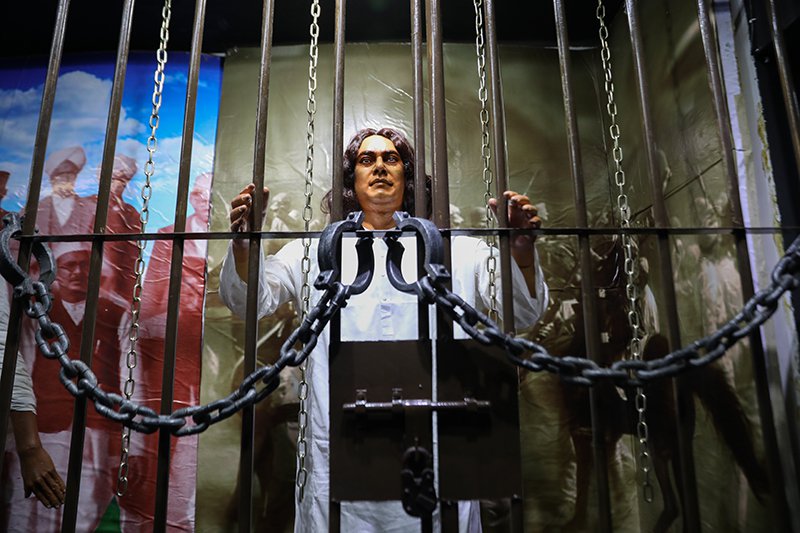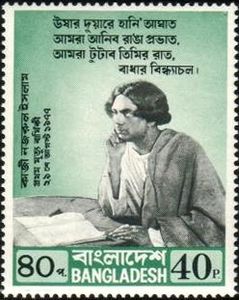Expressions of Rebellion and Protest: A Study of Kazi Nazrul Islam
Ms Amrita Majumdar, Asst.Prof.Dept.Of Music, Bankua Zilla Saradamani Mahila Mahavidyapith. Bankura University, West.Bengal
Abstract
Kazi Nazrul Islam was a Bengali Poet, Musician, revolutionary and a Philosopher who is best known for Pioneering works of Bengal Poetry. He is popularly known as Bidrohi kobi -rebel poet- as many of his works show case an intense rebellion against oppression of human slavery. Hatred and tradition. He called as the Bulbul or Nightingale of Modem Bengal music. In this paper I would like to describe the ideological stand point and aesthetical beauty of his creative works. His believe about Nationalism is entirely differ from Gurudev Rabindranath. Through his poetry and songs he spoke about the secularism.
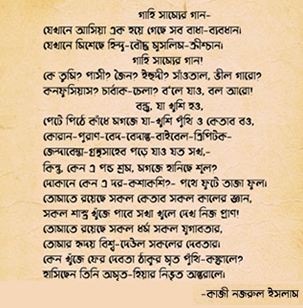
Introduction
Kazi Nazrul Islam popularly known as revolutionary artist in the modern world of literature and music. His contributions in literature and music are widely influenced in the renaissance movement of Bengal that has been spread over across the country. His poetry and the method of presentations he wrote it through his works that would be considered as the emergence of the modernity in Bengali literature during the 1920s and 1930s.His poems, songs, novel, short stories and plays are politically activated and expressed strong protest against various form of oppression, slavery, communalism, feudalism and colonialism of the British rulers in Indian province. Most of his works are banned by the British Government and they seized his books and filed criminal charges and long time he has been imprisoned in jail without any bail. British imperial government took him into the lonely asylum and tortured him as an ‘anti national’ Nazrul was born on May 24th, 1899 in Churulia village, Bardhawan in Pashchim Banga (Bengal), India. His childhood days he lost his father and that his life going through the huge struggle. Later on, young Nazrul join with a folk-opera group as a street performer where as he started to wrote poems and composing by himself for the performance. Nazrul involvement was an important formative influence in his artistic carrier. During the childhood days he was doing some job like tea maker and seller .in 1914 he came to Darirampur, Trishal in Maymansing district by the support of a kindhearted police man. This is the turning point of his life and after he completed his 10th class form this school. In 1917 he joined in the Indian Army and he served there more than three years and promoted as the Battalion Havildar Rank. When he was working in the Army, he found out free time and continued his literary works. He has published his first work ‘Autobiography of Delinquent’ (saogat, May 1919). After the First World War in 1920 the 49th Bengal regiment was disbanded.
Nazrul returned to Calcutta and begin his journalistic and literary life. His poems, essays, short stories began to appear regularly in a number of periodicals and within a year he became well-known among the readers and intellectual communities in Bengal. In 1921, Nazrul went to Santi Niketan to meet Rabindranath Tagore. In 1921 his life engaged with a Muslim girl Nargis but within a day he left from her and went to Kandirpar. He has continued his poet works there during that period Nazrul met Pramila Devi in the house of Birajasundari Devi in Comilla. Pramila later become his wife. On the way to Calcutta he stayed at Comilla where he becomes involved in the noncooperation movement against British Government.
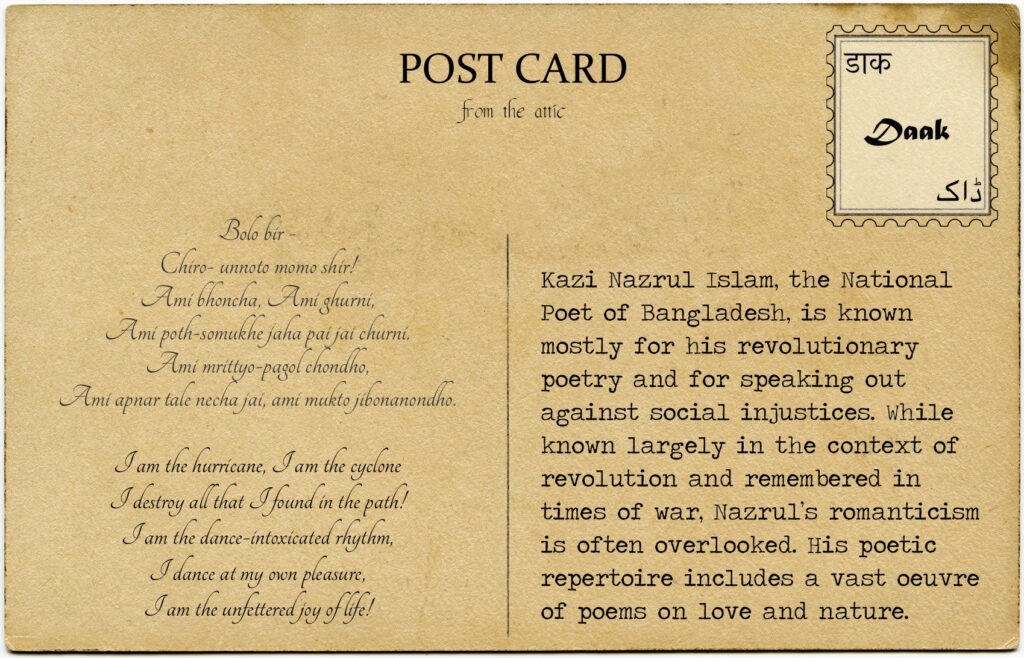
He composed and sang several memorable and inspiring patriotic songs. Since 1921 to 1942 he continuously writing number of poems and short stories and published in different volumes. Later, He has been associated with Calcutta Radio station and did songs for radio transmission. Later on, Govt. of India and Bangladesh Government honored Nazrul Islam by giving the highest Civilian award. In 1972 Nazrul Islam and family invited by Bangladesh Government and settled down at Dhaka. The great artist of modern India, Kazi Nazrul Islam passed away four years later on 29th August 1976 in Bangladesh.
Rebel Poet
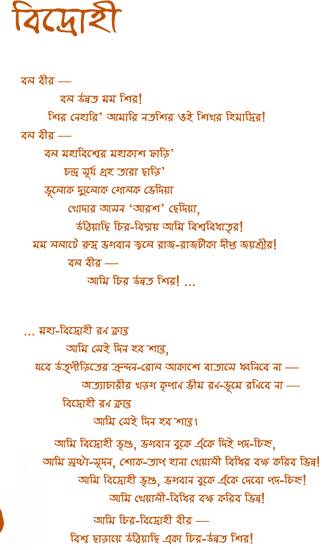
Nazrul fed up with Army life and finally he left the Army in 1920 and went back to Calcutta. When he was in Army, he has realized the value of the freedom and the condition of the motherland. He came back to Calcutta and began his literary works. He joined the staff of ‘Bangiya Mussalman Sahitya Samiti’ (‘Bengal Muslim Literary Society ‘).During the struggling period of his life period he published his first novel Bandhan-hara Freedom from bondage) in 1920.His first collection of Poem included ‘Bodhan’,’Shat-il-Arab’, ‘Kheya-parer-Tarani’ and ‘Badal Prater Sharab’. Both works received critical acclaim and the young Nazrul became popular among the readers and intellectual circle in Bengal. When he was working at the literary society Nazrul got a chance to associate with well-known writers like Mohammad Mozamel Haq, Afzal Haq, Kazi Abdul Wadud and Mohammad Shahidullah. He was regularly visit Calcutta club where he met writers like Gajendra Adda and the Bharatiya Adda. Nazrul frequently visited Santiniketan and met Gurdev despite many differences. He looks into Tagore as his mentor and both great souls reminded into close association.
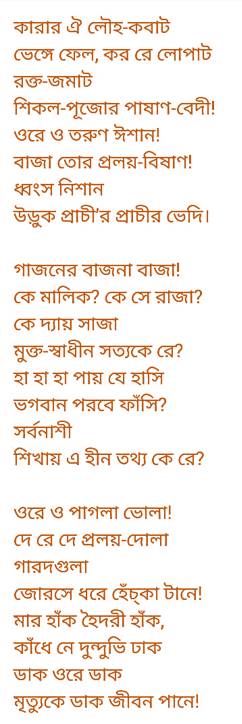
In 1922 Nazrul has published the Poem ‘Bidrohi’, it has given him more critical acclaim and treated as his outstanding work in Bengali literature. In this Poem he has uses the radical approaches. Set in heroic meter, this long poem invokes images from Hindu, Muslim and Geek mythology.
I am the unutterable grief,
I am the trembling first touch of the virgin,
I am the throbbing tenderness of her first stolen kiss.
I am the fleeting glace of the veiled beloved,
I am her constant surreptitious gaze…
I am the burning volcano in the bosom of the earth,
I am the wild fire of the words,
I am Hell’s mad terrific sea of wrath!
I ride on the wings of the lightning with joy and profound,
I scatter misery and fear all around,
I bring earth-quakes on this world!
I am the rebel eternal, I raise my head beyond this world,
High, ever erect and alone! (Translation by Kabir Choudhary)
This poem has published in ‘Bijli’ magazine, the poem causes popular sensation. The rebellious language and theme found a whistling noise among the common public, which correlated with the noncooperation movement- the first, mass nationalist campaign of civil disobedience against
British rule. Nazrul explores a synthesis of different forces in a rebel, destroyer and preserver, expressing rage as well as beauty and sensitivity. Later, Nazrul publishes his first anthology of Poem’ Agni veena’ (‘Lyre of Fire’) in 1922 Arabic-Persia-Urdu mixed Muslim Bengali style was the beginning of the future rebel poet. This was because the influence of Arabic and Persian was hereditary to him as his father was truly an Islamic religious person with utmost sincerity having no hatred to other religions and having a fondness to Persia and Bangla poems and to recitation of the holy Quran which is in Arabic language.
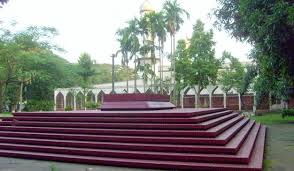
‘Mera dil be tab kiya teri abru-e Kaman; Jalajata haye ishque me jann pereshan. Here tumai dhani, chandra Kolonkini Mori kije bodoner shova, matoara pran; Bulbul Karte asachhe tai madhu pan’. ‘Gun shot of your chastity made my heart restless. My soul is perplexed and burning with love.Looking at you, moon faded. My soul mourns, seeing the beauty of your face. Nightingale drinks your honey.
His poems also spoke in philosophical terms of romantic love and the complete equality of men and women, and attacking the social and religious traditions of the time that ruled otherwise Nazrul came to identify the spirit of his thoughts and works as inherently rebellious.
Weary of struggles, I, the great rebel, shall rest in quite only when I find.
The sky and the air free of the piteous groans of the oppressed.
Only when the battle fields are cleared of jingling bloody sabers.
Shall I, weary of struggles, rest in quiet, I the great rebel.

Revolutionary Musician
Kazi Nazrul Islam dreamt of a worldwide fraternity akin to that propounded by Marxist philosophy. It was different from Rabindranath Tagore’s ‘Ei Bharater Mahamanober Sagarteer’ (the shores of the great humankind of the land of India). In 1922 he published political poem in ‘Dhumketu’ lead to a police raid in the magazine office. Arrested Nazrul entered a lengthy plea
before judge in the court. I have been quoted his plea as follows… ‘I have been accused of sedition. That is why I am now confined in the prison. On the one side is the crown, on the other flames of the comet. One is king, Scepter in hand; the other Truth worth the mace of justice. To plead for me. the king of all kings, the judge of all judges, the element of the truth the living God…. His laws emerged out of the realization of a universal truth about mankind. They are for and by a sovereign God. The king is supported by an infinitesimal creature; I by its eternal and indivisible creator. I am a poet; I have been sent by God to express the unexpressed. To portray the portrayed. it is God who is heard through the voice of the poet…My voice is but a medium of truth, the message of God…I am the instrument of that eternal self-evident truth an instrument that voice forth the message of ever-true. I am instrument of God. The instrument is not unbreakable. But who is there to break God’]
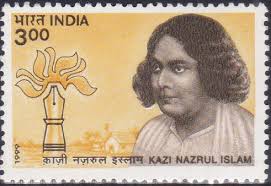
After one year of imprisoned he released from the prison. He went to Calcutta rejoin with non violence movement and made a critical opinion of Khilafat struggle. He badly criticized the religious fundamentalist approach and finally he left from the Khilafat and join with Bengal state congress. He started his creative work. He has associated with ‘Sramik Praja Swaraj Dal’ a political party committed to Independence movement and the service of peasant masses. On December 16, 1925 Nazrul started publishing the weekly ‘Langal’ with himself as Chief Editor.
Later, he realized that music has some power to influence the common people. In 1926 his work began to transform as he wrote poetry and songs that articulated the aspirations of the downtrodden masses. Nazrul assailed the socio-economic norms and political system that had brought upon misery. The songs of Nazrul giving voice to the aspirations of the masses have come to know as mass music or ‘Nazrul Giti ‘. His major poems include ‘Daridro’ (Poverty) O poverty,
Thou hast made me great
Thou hast made me honored like Christ
With his crown of thorns. Thou hast given me
Courage to reveal all. To thee I owe
My insolent, naked eyes and sharp tongue.
Thy curse has turned my violin to a sword…
O proud saint, thy terrible fire
Has rendered my heaven barren.
O my child, my darling one
I could not give thee even a drop of milk
No right I have to rejoice
Poverty weeps within my doors forever
As my spouse and my child
Who will play the flute?
He used the music as a medium of weapon to fight against the imperial British rulers. He has
written number of songs for the propaganda of freedom struggle.

‘Karar oi loyho kapat/venge Phyal korle lopat/rakto Makha sikal pujar pasan Bedi’
[‘Break and destroy
The Iron Gate of prison,
Destroy also the blood
Spattered manacles that is
Worshiped as the stone altar’]
Nasrul Songs are commonly called as Nazrul geeti, which is still practiced as one of the most popular variety of songs in Bengali, like Rabindra Sangeet.
Conclusion
Nowadays the question has aroused about the Nationalism. Some group of politically motivated people intentionally started a communalized propaganda against independent thinkers and artists those who are working with marginalized communities; they treated them as anti-nationals. In this paper I am trying to describe the rebellion voice of the great writer and musician Kazi Nazrul Islam and his ideological contribution. Nazrul Islam works not only for the Bengali literature and Music but also his creative contributions enlighten the value of universal harmony and peace. His works focus on the marginalized communities struggle. Through his poem, short stories and songs, he put on protest against the in equality and intolerance in the society. In his songs he has exploited the love, compassion and harmony among the people. He was a strong believer of secularism and his political ideology existed in humanistic approach.
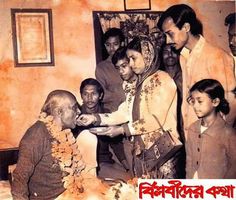
Reference
1) Chakravarty, Basuda. kazi Nasrul Islam. New Delhi: National Book Trust, 1968
2) Hakim, Abdul. The Fiery Lyre of Nazrul Islam. Dhaka: Bangla Academy, 1974
3) Islam. Rafiqul. Kazi Nazrul Islam: A New Anthology. Dhaka: Bangla Academy.1990
4) Gosvami, Karunamaya. Kazi Nazrul Islam: A Biography. Dhaka: Nazrul Institute, 1996

